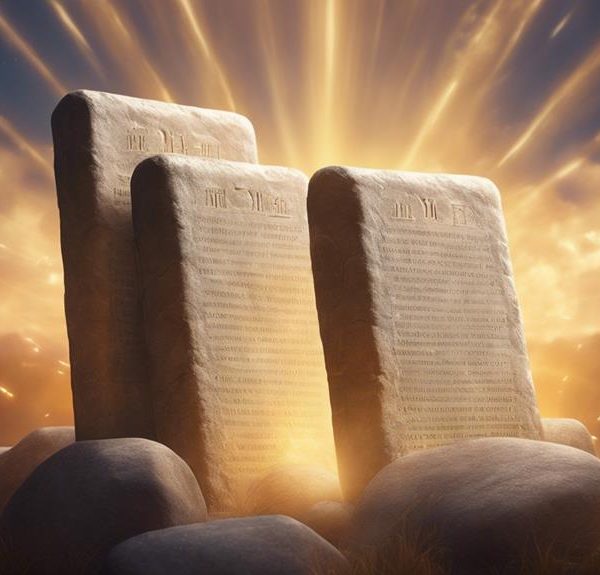Teleportation in the Bible reveals divine mysteries, blurring lines between ancient miracles and modern science fiction—dive in to unravel these intriguing narratives.

Teleportation in the Bible
Navigating the biblical landscape, you might stumble upon moments that seem plucked from the realm of science fiction, particularly instances of teleportation. From Philip's instantaneous journey after baptizing the Ethiopian eunuch to Elijah's whirlwind ascension into the heavens, these narratives invite you to question the boundaries between divine action and what modernity labels as fantastical.
As you explore these stories, you'll find yourself on the cusp of understanding how ancient texts intertwine with concepts that today's technology still dreams of achieving. Let's peel back the layers of these miraculous events, uncovering their significance in a world where the line between the physical and the metaphysical blurs.
Key Takeaways
- The Bible narrates instances like Philip's journey and Elijah's ascension that resemble modern concepts of teleportation.
- These stories challenge traditional views on space and time, suggesting a spiritual dimension to transportation.
- Divine transitions, such as Enoch's disappearance and Jesus' vanishing acts, symbolize deeper spiritual truths and mysteries.
- Mystical experiences, including Paul's heavenly vision, underscore the possibility of transcending physical realms through faith.
Philip's Instantaneous Journey

In the account of Philip's instantaneous journey, described in Acts 8:39-40, we observe a remarkable instance of what many interpret as teleportation within a biblical context. This event raises intriguing questions about the intersection of spirituality and quantum physics implications, prompting a reevaluation of traditional views on space, time, and the potential for spiritual transportation methods.
Scholars like Kaku (2012) have speculated that quantum entanglement might offer a theoretical framework for understanding such phenomena, suggesting that if particles can be instantaneously linked across distances, perhaps there's a spiritual parallel. This perspective encourages a broader consideration of miracles, not as violations of natural law, but as expressions of deeper laws not yet fully understood.
Moreover, the narrative challenges us to expand our conception of transportation beyond physical mechanisms to include spiritual dimensions. As Davies (2004) posits, if the universe is more interconnected than currently recognized, Philip's experience might illuminate pathways of movement that transcend conventional physical explanations, pointing towards a synthesis of science and spirituality in understanding transportation.
Thus, Philip's story invites a deeper exploration into the realms of quantum physics and spiritual transportation methods, offering a unique lens through which to explore the nexus of faith and science.
Elijah's Whirlwind Ascension

Exploring further, Elijah's whirlwind ascension, detailed in 2 Kings 2:11, offers another intriguing biblical instance where the lines between the physical and the spiritual blur, challenging our understanding of transportation and ascension. This event, where Elijah is taken up to heaven in a whirlwind, isn't just a miraculous departure but is rich in prophetic symbolism and historical interpretations. Scholars have often pondered the significance of this moment, highlighting its role in illustrating the transition of prophetic authority from Elijah to Elisha, as well as its demonstration of God's power and divine intervention.
Historical interpretations of this account have varied, with some viewing it as a literal historical event, while others see it as symbolic, representing the spiritual elevation of Elijah. The whirlwind, in this context, serves not only as a method of transportation but also as a symbol of divine presence and action. This moment in biblical history has fueled discussions on the intersection of the divine with the earthly realm, offering a profound example of how the divine can dramatically intervene in human affairs.
Elijah's ascension remains a pivotal moment, embodying themes of prophetic continuity, divine selection, and the seamless interplay between the spiritual and physical worlds, as narrated in the biblical tradition.
Enoch's Mysterious Disappearance

Another captivating episode of divine intervention within the biblical narrative is Enoch's mysterious disappearance, as recorded in Genesis 5:24, which presents a profound exploration of the boundaries between the earthly and the divine. Enoch's case diverges from the typical mortal experience through a direct transition to the divine realm, bypassing death—a theme that ancient interpretations have variously explored.
His legacy, as a man who 'walked with God' and then 'was not, for God took him,' offers an intriguing glimpse into early Judeo-Christian perceptions of piety and divine favor.
- Genesis 5:24: This verse succinctly encapsulates Enoch's disappearance, suggesting a seamless transition to the divine.
- Divine Favor: Enoch's walking with God illustrates an intimate relationship, implying a level of piety and righteousness that merited divine favor.
- Mortality and Immortality: Enoch's story blurs the lines between human mortality and divine immortality, challenging conventional narratives about life and death.
- Ancient Interpretations: Texts like the Book of Enoch expand upon his legacy, reflecting on his righteousness and prophetic roles, which have influenced both Jewish and Christian eschatology.
Through Enoch's enigmatic journey, you're invited to ponder the complexities of faith, righteousness, and the possibility of transcending mortal confines.
Jesus' Sudden Vanishing Acts

Throughout the New Testament, Jesus' sudden disappearances and reappearances serve as pivotal moments that both mystify and enlighten his disciples, revealing deeper layers of his divine nature and mission. These instances are not merely for spectacle but are rich with divine intervention and spiritual symbolism.
Event |
Symbolism & Divine Nature |
|---|---|
Vanishing from the crowd (Luke 4:30) |
Jesus eludes an angry mob, illustrating his control over physical boundaries. |
Walking on water (Matthew 14:25-26) |
Demonstrates mastery over nature, symbolizing spiritual support in times of doubt. |
Disappearing after the breaking of bread (Luke 24:31) |
His vanishing act post-resurrection underscores the spiritual presence in the Eucharist. |
Appearing in locked rooms (John 20:19) |
Highlights his transcendent, resurrected body and the peace he brings to the fearful. |
Ascension into heaven (Acts 1:9) |
The ultimate act of divine departure, symbolizing his continuing spiritual leadership from the heavenly realm. |
These acts of sudden vanishing and reappearing underscore Jesus' divine authority and mission, weaving a rich tapestry of spiritual symbolism that continues to inspire and challenge believers to this day.
Paul's Heavenly Vision

In his epistle to the Corinthians, Paul vividly recounts a profound experience, where, caught up to the third heaven, he was granted insights into the divine realm. This event isn't merely a story; it's a cornerstone for understanding the spiritual significance and vision interpretation within Christian theology.
Analyzing Paul's heavenly vision, scholars have highlighted several key points:
- The concept of the 'third heaven': This term implies a tiered structure of the cosmos, where Paul's experience takes place in a realm beyond the physical and the celestial.
- Vision interpretation: Paul's experience is often interpreted as a testament to the possibility of divine revelation and spiritual enlightenment beyond human understanding.
- Spiritual significance: The vision underscores the belief in the soul's ability to transcend earthly confines and partake in heavenly mysteries.
- The role of visions in faith: Paul's account validates the role of mystical experiences and visions in nurturing and affirming one's faith journey.
Through this lens, Paul's heavenly vision serves as a pivotal example of how transcendental experiences have shaped the theological discourse, offering insights into the nature of divine encounters and their profound impact on spiritual development.
Frequently Asked Questions
How Have Interpretations of Teleportation Events in the Bible Evolved Over Time Among Various Christian Denominations?
You've noticed how interpretations of certain biblical events have changed, reflecting shifts in historical context and denominational perspectives. Initially, these narratives were often viewed literally across many Christian groups.
However, as theological scholarship has evolved, so has the understanding of these stories. Some denominations now interpret them metaphorically or symbolically, emphasizing spiritual over physical phenomena.
This evolution highlights the dynamic nature of religious interpretation and its adaptation to new scholarly insights and cultural changes.
Are There Any Scientific Theories or Perspectives That Attempt to Explain or Parallel the Teleportation Instances Mentioned in the Bible?
You're diving into an intriguing area where science meets ancient texts. Researchers have speculated on Quantum entanglement and Wormhole theory as potential scientific frameworks that could, theoretically, parallel instances of instantaneous travel.
These concepts, originating from physics, suggest complex mechanisms for instant connections across distances. While not directly explaining biblical events, they offer a fascinating lens through which to analyze seemingly miraculous narratives, providing a bridge between faith and science.
How Do Other Major World Religions View the Concept of Teleportation or Similar Miraculous Movements Compared to the Biblical Accounts?
You'd find that major world religions have their own versions of teleportation or miraculous movements. Hindu mythology parallels these narratives with stories of deities and sages instantaneously moving between the heavens and earth.
Islamic mystical accounts, too, speak of saints traveling vast distances in moments, a concept known as Tay al-Ard. Compared to biblical accounts, these stories underline a shared fascination with transcending physical limitations across different faith traditions.
What Role Does Faith Play in Accepting the Accounts of Teleportation in the Bible, and How Do Skeptics Respond to These Stories?
You're exploring how faith influences acceptance of extraordinary narratives, and skeptics' counterpoints, focusing on historical accuracy and cultural impact.
Faith often acts as a lens, magnifying belief in such accounts, where historical and cultural contexts enrich understanding.
Skeptics, however, question these stories' plausibility, leaning on empirical evidence and logical analysis.
This dichotomy highlights the complex interplay between belief systems and their interpretations of seemingly miraculous events.
Can the Concept of Teleportation in the Bible Be Connected to Any Modern-Day Spiritual Practices or Beliefs Outside of Traditional Christianity?
You might find the concept of teleportation interesting, especially when explored through the lens of quantum spirituality and mystical traditions.
These modern spiritual practices draw upon ideas that can seem similar to biblical teleportation, suggesting a bridge between ancient beliefs and current quantum theories.
Scholars argue that such connections reflect a deeper, universal quest for understanding beyond the physical realm, engaging both traditional Christians and those outside the faith in profound ways.
Conclusion
In analyzing biblical accounts of teleportation, we've observed a recurring motif of divine intervention facilitating instantaneous travel or disappearance. Philip's journey (Acts 8:39-40), Elijah's ascension (2 Kings 2:11), Enoch's disappearance (Genesis 5:24), Jesus' vanishing acts (Luke 24:31; John 20:19), and Paul's vision (2 Corinthians 12:2-4) underscore a theological dimension to teleportation, highlighting its role as a narrative device that emphasizes God's omnipotence and the permeability of physical and spiritual realms.
This analysis suggests that biblical teleportation serves as a metaphor for divine power and mystery.



Sign up